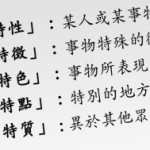You searched for listening | Page 28 of 32 | Hacking Chinese Page 28
-
About fossilisation and improving your Chinese pronunciation
It’s a fact that most foreign adults don’t acquire native like pronunciation in Chinese, but what’s the reason? In most debates at this point, someone will throw in the word “fossilisation”, as if that actually explained anything. This article is about why the concept of fossilisation is bunk and how we should think about adult pronunciation instead.
Read → -
What’s your next step to master Chinese?
Procrastination is a major problem facing anyone trying to learn Chinese outside class (which should include almost everyone because if you only do what you’re required to do in class, you won’t get very far). In this article, I share some ideas on how I handle big projects and intimidating tasks. The gist is that you need to break things down and you need to know what your next action is.
Read → -
Why you need goals to learn Chinese efficiently
Learning without goals might seem like a reasonable choice at first, but after a closer look, it isn’t such a good idea. First, it’s hard to imagine not having any goal at all, so setting goals is more about making your implicit goals explicit. Second, focusing only on having fun will lead to some very unusual learning strategies.
Read → -
Do you really know how to count in Chinese?
Counting in a foreign language is one of the first things we learn, yet it takes very long to master numbers in Chinese. Most students abandon practising numbers too early, leading to a surprising and serious gap in our knowledge: we simply don’t know the numbers as well as we think we do, which will cause problems both in real life and in listening comprehension tests. Do you really know how to count in Chinese? Tests included!
Read → -
5 insights from the first year of a master’s program in Taiwan
Pursuing an academic degree taught in Chinese is a great example of instrumental motivation. This article contains five insights from my first year at the Graduate Institute for Teaching Chinese as a Second Language (華語文教學研究所) in Taipei, Taiwan. Among other things, the article is about grammar, native speakers, the importance of having fun and the essence of communicative learning.
Read → -
How to get good grades when studying Chinese
Ideally, we would study Chinese just because we want to and in any manner we see fit, but this isn’t how it works for most students. Instead, we need to care about tests and grades, an extra layer added on top of our own personal goals and ambitions. This article is about studying Chinese when those tests and grades really matter, a kind of basic survival guide for both exams and courses.
Read → -
Dealing with near-synonyms in Chinese as an independent learner
Near-synonyms cause major headaches for language learners and it’s especially hard for Chinese learners due to the lack of adequate resources in English. This article suggests some ways of handling the problem of near-synonyms when learning Chinese.
Read → -
If you think spaced repetition software is a panacea you are wrong
Spaced repetition software (SRS) is widely discussed online, and generally speaking, there is a spectrum between people who think SRS is the holy grail of learning anything and those that think SRS is artificial, passive and just a waste of time. This article argues that this polarisation is a serious mistake, SRS is a tool and like any other tool, how we use it determines what we get from it.
Read → -
Immersion at home or: Why you don’t have to go abroad to learn Chinese
You don’t have to go abroad to learn Chinese. The main difference between staying at home and going abroad is that it requires less effort to learn once you’re there (although it still requires quite a lot of effort). This means that you can learn Chinese at home, provided that you are determined enough and create an immersion environment yourself. This article gives suggestions and advice on how to achieve that.
Read → -
The question you have to ask about your Chinese teacher or course
The most important question you should ask yourself about your current teacher or course is what you won’t learn. Since this isn’t something most teachers and schools like to talk about, it’s typically something you need to figure out on your own. This article discusses this question from various angles, highlighting the importance of being aware of what you need to study on your own.
Read →









